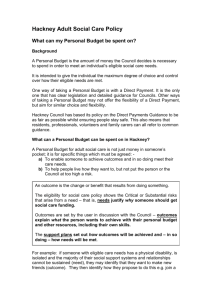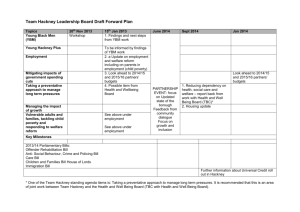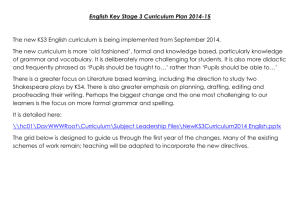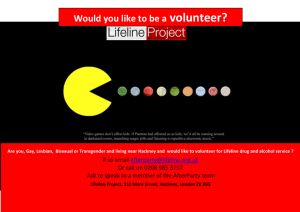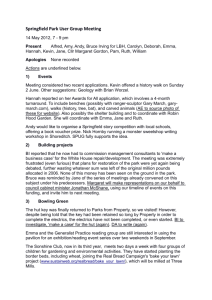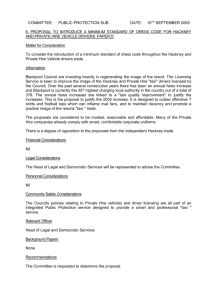CASE STUDY: Radio 1 Hackney Weekend event
advertisement
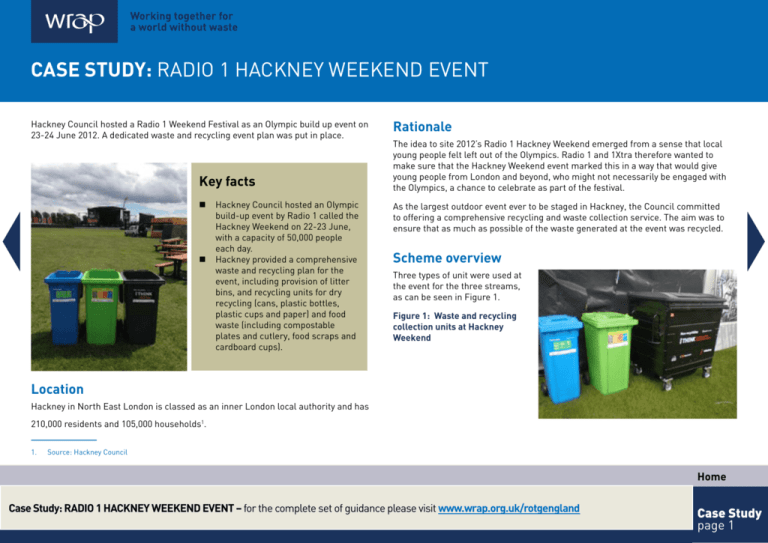
WRAP – Case Study – RADIO 1 HACKNEY WEEKEND EVENT – October 2012 CASE STUDY: Radio 1 Hackney Weekend Event Hackney Council hosted a Radio 1 Weekend Festival as an Olympic build up event on 23-24 June 2012. A dedicated waste and recycling event plan was put in place. Key facts Hackney Council hosted an Olympic build-up event by Radio 1 called the Hackney Weekend on 22-23 June, with a capacity of 50,000 people each day. Hackney provided a comprehensive waste and recycling plan for the event, including provision of litter bins, and recycling units for dry recycling (cans, plastic bottles, plastic cups and paper) and food waste (including compostable plates and cutlery, food scraps and cardboard cups). Rationale The idea to site 2012’s Radio 1 Hackney Weekend emerged from a sense that local young people felt left out of the Olympics. Radio 1 and 1Xtra therefore wanted to make sure that the Hackney Weekend event marked this in a way that would give young people from London and beyond, who might not necessarily be engaged with the Olympics, a chance to celebrate as part of the festival. As the largest outdoor event ever to be staged in Hackney, the Council committed to offering a comprehensive recycling and waste collection service. The aim was to ensure that as much as possible of the waste generated at the event was recycled. Scheme overview Three types of unit were used at the event for the three streams, as can be seen in Figure 1. Figure 1: Waste and recycling collection units at Hackney Weekend Location Hackney in North East London is classed as an inner London local authority and has 210,000 residents and 105,000 households1. 1. Source: Hackney Council Home Case Study: RADIO 1 HACKNEY WEEKEND EVENT – for the complete set of guidance please visit www.wrap.org.uk/rotgengland Case Study page 1 WRAP – Case Study – RADIO 1 HACKNEY WEEKEND EVENT – October 2012 The collections were conducted by Hackney’s in-house waste operations team. The litter was sent to London Waste in Edmonton to an energy from waste (EfW) facility, the recycling was sent to Bywaters in Bow, and the food and food packaging waste was sent to Biogen Greenfinch, an anaerobic digestion (AD) plant. Staff training took place prior to the event for all staff carrying out colleciton in and around the site the week before the event including training on the units, maps of the site, how the collecitons would be carried out, health and safety, etc. Signage WRAP iconography is used as far as possible on the signage on the recycling units with the Recycle for London ‘swoosh’ and the material icons for paper, cans, plastic bottles and an amended plastic cups changed to beer cups, as can be seen below. Table 1 Details of containers Domestic waste unit Recycling unit Food waste unit Number of containers 291 295 200 Type of container Wheeled bins and euro bins Wheeled bins and euro bins Wheeled bins Container capacity (litres) 240 litre x 140 140 litre x 70 1,100 litre x 81 240 litre x 140 140 litre x 70 1,100 litre x 85 140 litre Container manufacturer Wheeled bins – Schaefer Eurobins – Taylors Wheeled bins – Schaefer Eurobins – Taylors Schaefer Cost per container Framework agreement Framework agreement Framework agreement Waste streams segregated Domestic waste Cans, plastic bottles, plastic cups and paper Food waste, paper plates and cutlery and cardboard cups Special features Dedicated signage Dedicated signage Dedicated signage Figure 2: Hackney Weekend waste and recycling unit signage Home Case Study: RADIO 1 HACKNEY WEEKEND EVENT – for the complete set of guidance please visit www.wrap.org.uk/rotgengland Case Study page 2 WRAP – Case Study – RADIO 1 HACKNEY WEEKEND EVENT – October 2012 Capital expenditure Performance, contamination and monitoring The total cost of the units was approximately £50,000, funded by Hackney Council. They were purchased for the event but would be reused for other purposes: food waste bins placed in schools residual bins for street level wheeled bin round replacement mixed recycling units for estates food waste expansion/slave bins residual 1100 litre eurobins for commercial waste/domestic waste bins 1100 litre eurobin for mixed recycling service on estates and a fixed number of bins retained for future events recycling. There was a team of five waste services staff monitoring the units across the event, with a particular focus on front-of-house and vendors. A proactive briefing was given to all vendors prior to the event (Figure 4). Figure 4: Excerpt from proactive vendors briefing at the event Collection and storage arrangements There were a number of units retained behind the scenes of the event to enable exchanges of full for empty units to take place as required. RCV collection vehicles for mixed recyclables and food waste were parked behind scenes alongside skips for the residual waste. Communication An article in the local bi-monthly Hackney Today newspaper was used to communicate the RotG service to attendees. The units themselves are colourful and stand out with the clear signage, hence, the units themselves were used to communicate the service to attendees. Figure 3: BBC Radio 1 signage for Hackney Weekend Home Case Study: RADIO 1 HACKNEY WEEKEND EVENT – for the complete set of guidance please visit www.wrap.org.uk/rotgengland Case Study page 3 WRAP – Case Study – RADIO 1 HACKNEY WEEKEND EVENT – October 2012 As there was controlled waste entering the site, it meant Hackney were able to cater for specific waste streams. From across the Council, there was a team of volunteer ‘Green Messengers’ monitoring contamination and removing contaminants from the mixed recycling stream. Briefings were delivered to all operatives prior to the event and the operatives were all managed by supervisors on the ground. There was reactive liaison with vendors at the event and also identification of contaminated bins, directing these for disposal. Contamination was low, as can be seen from the Figure 5. Lessons learned Due to restrictions, the team managing the waste collection at the event were unable to have more RCV collection vehicles on site. They did have co-location of RCVs i.e. one each for residuals and recycling or the use of a split body vehicle to keep streams separate and avoid any potential for confusion. It would have been good to have more RCV’s available. Enhanced briefings took place with vendors before the event to ensure familiarity and compliance with the system put in place, with limited success. In future, Hackney would focus on the collection of mixed recyclables only within the arena, as very little food waste was collected from the public (possibly due to the high cost of food ensured little wastage). Also the food waste stream was heavily contaminated and not fit for reprocessing. Next time, Hackney would have more staff to undertake litter picking, separation of materials, monitoring of sites, emptying of bins, particularly during later stages of the day when crowd numbers increased. Acknowledgements With thanks to Ander Zabala, Waste Prevention Officer, and Richard Gilbert, Waste and Environment Manager at Hackney Council. Figure 5: View from inside a recycling unit at the event The aim was to achieve a 70% recycling rate and despite final tonnage figures not yet confirmed, the event is on course for a 65% recycling rate. Home Case Study: RADIO 1 HACKNEY WEEKEND EVENT – for the complete set of guidance please visit www.wrap.org.uk/rotgengland Case Study page 4 For further information about Recycle on the Go please visit: www.wrap.org.uk/rotgengland While we have tried to make sure this case study is accurate, we cannot accept responsibility or be held legally responsible for any loss or damage arising out of or in connection with this information being inaccurate, incomplete or misleading. This material is copyrighted. You can copy it free of charge as long as the material is accurate and not used in a misleading context. You must identify the source of the material and acknowledge our copyright. You must not use material to endorse or suggest we have endorsed a commercial product or service. Please note that this information was correct at the time of writing, but the regime is liable to change with government policy. WRAP will endeavour to update this document when changes are made to the regime. For more details please see our terms and conditions on our website at www.wrap.org.uk www.wrap.org.uk/rotgengland Waste & Resources Action Programme Helpline freephone: 0808 100 2040 E-mail: info@wrap.org.uk Home page 5
